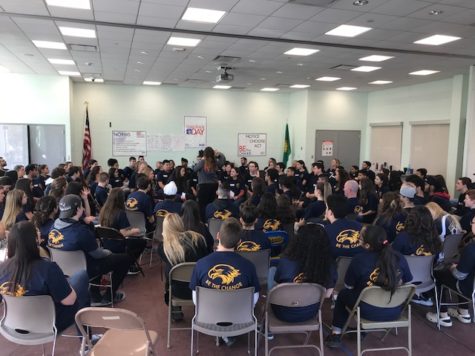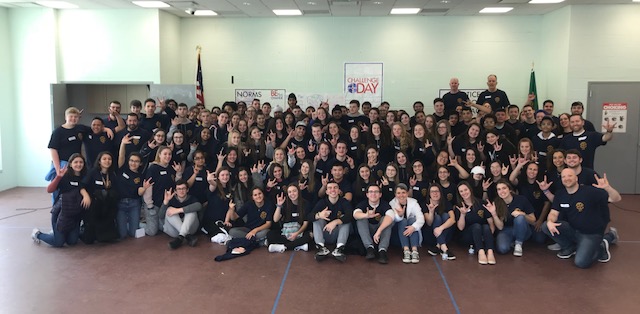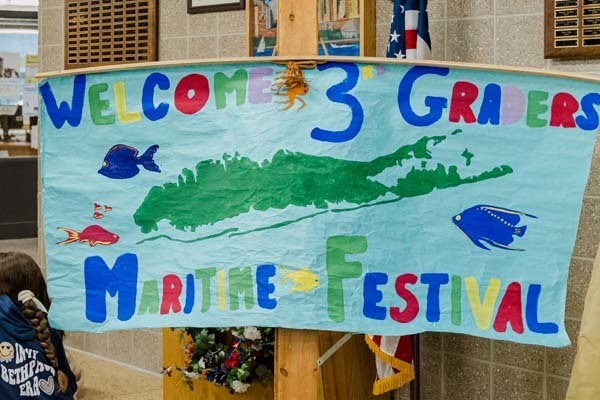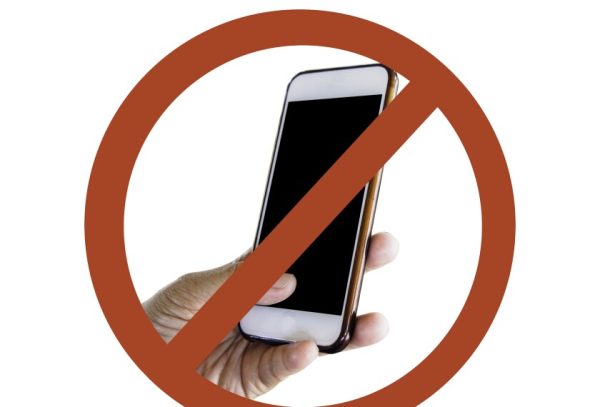Challenge Day: Will it Last Forever…or Even a Month?
Challenge Day: Will it Last Forever…or Even a Month?
We spend more time in school than we do at home. We see our classmates in the hallways sometimes more than our own parents. We are a family and a community, yet sometimes we don’t always act like it.
Students bully each other, individuals feel isolated, friends act secretively, all while we try to learn and get an education. Shouldn’t we know those we see the most in our life? Shouldn’t we treat each other with utmost respect and compassion?
Mr. Benjamin, one our guidance counselor claimed that although the staff tries very hard to keep BHS a safe, welcoming, and friendly place, “there’s very few ways to teach empathy to our students.” That is why, he said, “we have been doing Challenge Day for 12 years.”
Challenge Day is a voluntary, in-school trip for the sophomore class over the course of two days. It is an anti-bullying workshop lasting up to seven hours. According to ChallengeDay.org, the activity “addresses some common issues seen in most schools including cliques, gossip, rumors, negative judgments, teasing, harassment, isolation, stereotypes, intolerance, racism, sexism, bullying, violence, suicide, homophobia, hopelessness, apathy, and hidden pressures to create an image, achieve or live up to the expectations of others.”
So what exactly IS Challenge Day? During one recent class discussion, one upperclassman remembers it this way: “It’s a day where everyone cries.”
Cry? I don’t want to cry. Should I not go on this trip? This was the thought process all sophomores previously seemed to go through. However, although I am not allowed to tell you what I experienced, I would go on the record and definitely recommend it… What happens at Challenge Day stays at Challenge Day. It’s supposed to be a confidential, comforting day.
Yet, what does the power of 100 kids, 25 teacher volunteers, and two “program facilitators” in one giant hockey back room have on us?
According to Valenni Passaro, a sophomore who participated in day two of this year’s Challenge Day, “it gave me a great deal of insight into the way other people live and the way they feel about themselves. It helped me understand how everyone is going through different situations. Most of all, it helped me realize that you are never alone because there was not a single situation I or anyone else has been through that someone else hadn’t also experienced.”
The school atmosphere completely changed in the days during and immediately after Challenge Day. Students waved at each other and apologized for mistakes they had previously made. Will it last like this forever?
Recently, in a school survey including a number of BHS sophomores, the question ‘do you think Challenge Day’s impact will last?’ received a shocking response: 77% said no! Leaving 18% saying yes, and 5% unsure. Why? If Challenge Day is so influential and everyone who left was a completely different person, why couldn’t this day stick with us…and remain forever?
BHS yoga teacher and coach Mrs. Bennett said, “Unfortunately, Challenge Day does not last. With everything in life, to make it stick, it comes with practice. A one-day course won’t change anything.”
According to an exclusive on-the-phone interview with one of Challenge Day’s co-founders, Rich Dutra, “the feeling of Challenge Day, where everyone is compassionate at the same time, is hard to keep going, because people don’t feel that emotional vulnerability all the time, and they get closed up. You can’t control other people, it’s up to the individual to drive the kindness forward.”
The cofounders of Challenge Day, Rich and Yvonne Dutra, have had experiences with this from their own difficult childhood. Rich explained how hard and lonely it was for them growing up. Once they met, their own life experiences provoked them to create better lives for kids around the world. They then designed the program “not to only focus on specific forms of oppression, but the manifestations from our world that train us to be separate from each other. The idea of our goal is not to settle for solely tolerance, but to additionally break down the wall of isolationism, separation, and to say ‘I love you’ at the end of the day.”
Throughout Challenge Day, BHS students endure hours of dancing, laughing, crying, blushing, and sobbing in group therapy. If you weren’t emotional before the previous activities, then it was a guarantee you were after “Cross the Line If…”. It was so successful, that in the days following, the hallways will be full of whispers of Trish and Kevin (our program leaders), and the infamous exercise called “Cross the Line If…” Why was this the most influential activity?
Mr. Dutra replied, “it’s so powerful, because it shows our shared humanity. It’s non-verbal, yet it shows people can have compassion towards themselves and others. It sends such a relief to learn you aren’t alone.”
Personally, I specifically loved that activity. The room was silent, and all you heard was Trish speak into the microphone, “Cross the line if you…” This activity made me realize everyone either went through or is going through something challenging. You don’t know their story, you don’t know how they feel, yet it’s up to you to decide how you will go on and treat that person. This activity changed the way people see each other. Previously, instead of automatically judging someone immediately and assuming who they are, you allow them the chance to leave the impression they want on you.
Furthermore, the Cross the Line activity gave us insight into the teachers and staff in the school. When we are young, we often believe the misconception that teachers live in the schools. They are there, always, standing in front of you, pointing at a whiteboard, reciting the periodic table or solving quadratic equations. But this activity proves that they are also humans, facing hard and challenging lives.
Mr. Benjamin, who also happens to be human, said it allows “kids to see there are other adults in their life who survived and went through the same situations as you and acknowledges that you’re not alone. I think it brings students and teachers together, and it’s something that sticks to them.”
Challenge Day is clearly what it is advertised to be: a challenging day. However, according to many, it was worth it, and an important lesson that should be taught globally.
Valenni Passaro said, “I would definitely do it again and recommend it because it illuminates parts of people that no one would have known otherwise.”
It might not have changed the entire grade as a whole; it might not even have changed the person that you sit next to in math class… But it’s up to you, to decide what you take from this experience.
As the great founder Mr. Dutra once said, “The legacy we leave in the world should matter to us. The choices we make in the moment create that legacy. So… make one choice at a time to the world you want to create.”

Anastasija Petrovska, often referred to as Ana, is a sophomore at Bethpage. She is Macedonian, born and raised in Queens, and moved to Long Island a year...










